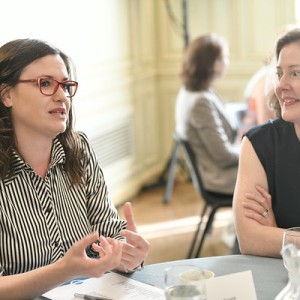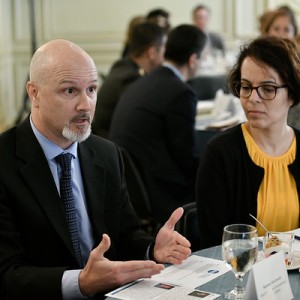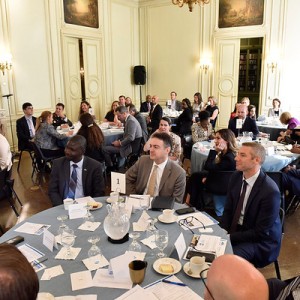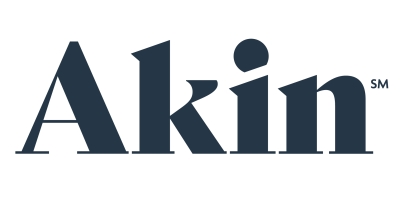Understanding Washington: Navigating the State Department

Washington is a big small town; you never know who you might meet or where you will encounter them. At the Meridian Center for Diplomatic Engagement’s most recent event in the Diplocraft series, Understanding Washington: Navigating the State Department, current and former officials from the State Department and the international diplomatic corps repeated this adage. Interpersonal connection is critical to navigating Washington. In a big small town, relationships matter; Washington provides plenty of opportunity to build them.
Diplocraft is a regular series that facilitates deep dives into critical issues and U.S. institutions for the international diplomatic corps in Washington. On May 29, 2019, nearly 50 current and former State Department officials and foreign diplomats gathered on the Meridian campus to discuss best practices for diplomats to collaborate with the State Department. Participants engaged in roundtable discussions following framing remarks from both Ambassador Paula Dobriansky and Congresswoman Ileana Ros-Lehtinen. Dobriansky spoke about the structure of the State Department as it relates to the American policymaking process to provide diplomats with better understanding of how to serve their country’s interests with State actors’ strategic goals in mind. Ros-Lehtinen highlighted the intentional ambiguity in the Constitutional framework for American foreign policy as creative tension between branches of government regarding foreign policy reflects the spirit of democracy. While the democratic process can be challenging, it’s important for the diplomatic corps to consider the structure of American government when working with the State through this process.
Tips for the International Diplomatic Community to Navigate the State Department
1) Develop relationships now, not during a crisis
Constant contact is essential to relationship development with State Department officials. While administrations and policies change, the internal mechanics of the State Department do not. Get out in Washington and engage with officials outside of the office and connect on a personal level. Meridian can help – come to events like Welcome to Washington to create and cement relationships with public officials before you need them. Don’t wait until a crisis to reach out to State contacts. Invite your colleagues at State to events at your embassy and update them on significant happenings in your home country to remind them of the strategic importance of your diplomatic relationship.
2) Work at all levels
Meet with relevant officers at each level, from the Desk Officer up the line to the Secretary, both at the regional and functional bureaus. Familiarization with the chain of command in these bureaus improves your ability to develop meaningful connections with those State officials best positioned to address your interests and to work toward the shared goals of your country and the State Department. Desk Officers connect embassy staff with counterparts from other U.S. agencies. Get acquainted with offices and staff here.
3) Flag relevant resources for State Department officials
The State Department gathers country-specific information about issues like human trafficking, counterterrorism, and cyber security from U.S. embassy staff on the ground, foreign governments, and NGOs working on those issues or present in the local environment. You can buttress the State Department’s ability to serve your country’s interests and to protect your people by flagging relevant resources for State on germane pressing issues. Refer to State’s directory to reach out to relevant offices.
4) Align your message with the priorities of State
Disagreement within the State Department happens; it is a dynamic institution made up of individuals with diverse backgrounds and opinions. The policy process in the U.S. enables airing of many perspectives to come to a collaborative solution. Understand how your goals address the interests of the various bureaus and offices with which you interact to encourage compromise. How do your country’s interests serve the strategic goals of State offices? In what ways do State offices work synergistically toward your goals? Keep their decision-making process in mind to make a meaningful ask.
5) Market your country
Don’t assume that someone knows everything about where you are from, regardless of your country. You should sell your home country by providing your new contacts with learning experiences; teach them something unique and under-advertised about your homeland to leave them with lasting impressions of both you and your home. You can foster greater understanding of your country by encouraging State administrators to participate in exchanges that provide cultural context and opportunity to visit your home country. In making new connections, be clear about your country’s priorities and why you value their engagement.
6) Engage holistically
Ask yourself whether a regional or a functional approach best serves your needs. Global issues relating to your country overlap in these offices; who is best suited to work with you? Where will your efforts be most cogently expressed? Think creatively to develop pointed strategic approaches that meet your immediate goals for your country.
The Meridian Center for Diplomatic Engagement accelerates collaboration between the international diplomatic corps and the U.S. public and private sectors to address global challenges and opportunities facing the United States and the world today. Meridian convenes programs across borders, parties and industries enabling participants to connect in intimate settings with top officials and policy-makers, dive deeply into issues, understand how Washington works and strengthen peer-to-peer relationships. Our ‘Diplocraft’ series provides senior diplomats with a greater understanding of the inner workings of Washington through policy deep dives and peer networking opportunities. The series of convening programs provides context on key areas of mutual concern.
This program was implemented in cooperation with Akin Gump, a Meridian Center for Diplomatic Engagement founding partner.
Resources:
See full gallery Learn more about Diplocraft
Project summary
| Understanding Washington: Navigating the State Department | May 2019 | |
|---|---|
| Number of Attendees: | 47 |
| Regions: | Africa, Europe and Eurasia, Near East and North Africa, South and Central Asia, Western Hemisphere |
| Countries: | Angola, Argentina, Australia, Azerbaijan, Mozambique, Saudi Arabia, Haiti, Jamaica, Trinidad and Tobago, Colombia, Montenegro, Sri Lanka, India, Canada, Serbia, Burkina Faso, Netherlands, Portugal, Greece, South Africa, Finland, New Zealand, France, North Macedonia, Lithuania, Croatia, Zimbabwe |
| Impact Areas: | Foreign Policy, Public Diplomacy |
| Program Areas: | Diplomatic Engagement |
| Partners: | Private Sector |




